
The Leonardo da Vinci Award is conferred by the entire academy, recognizing individuals for their exceptional lifelong achievements. The selection process for this prestigious award undergoes rigorous evaluation and selection by the EurASc Presidium.
The Blaise Pascal Medal recognizes individuals for their outstanding contributions to science, technology, and research education. The selection process involves meticulous evaluation and assessment by the Division Scientific Committees, with final approval from the EurASc General Board.
We extend our heartfelt congratulations to all the deserving recipients for their remarkable achievements. The Blaise Pascal Medals and the Leonardo da Vinci Award will be formally presented during the 2025 EurASc Annual Symposium & Ceremony, to be held at CERN in Geneva. The medal ceremony is scheduled for 18 December 2025.
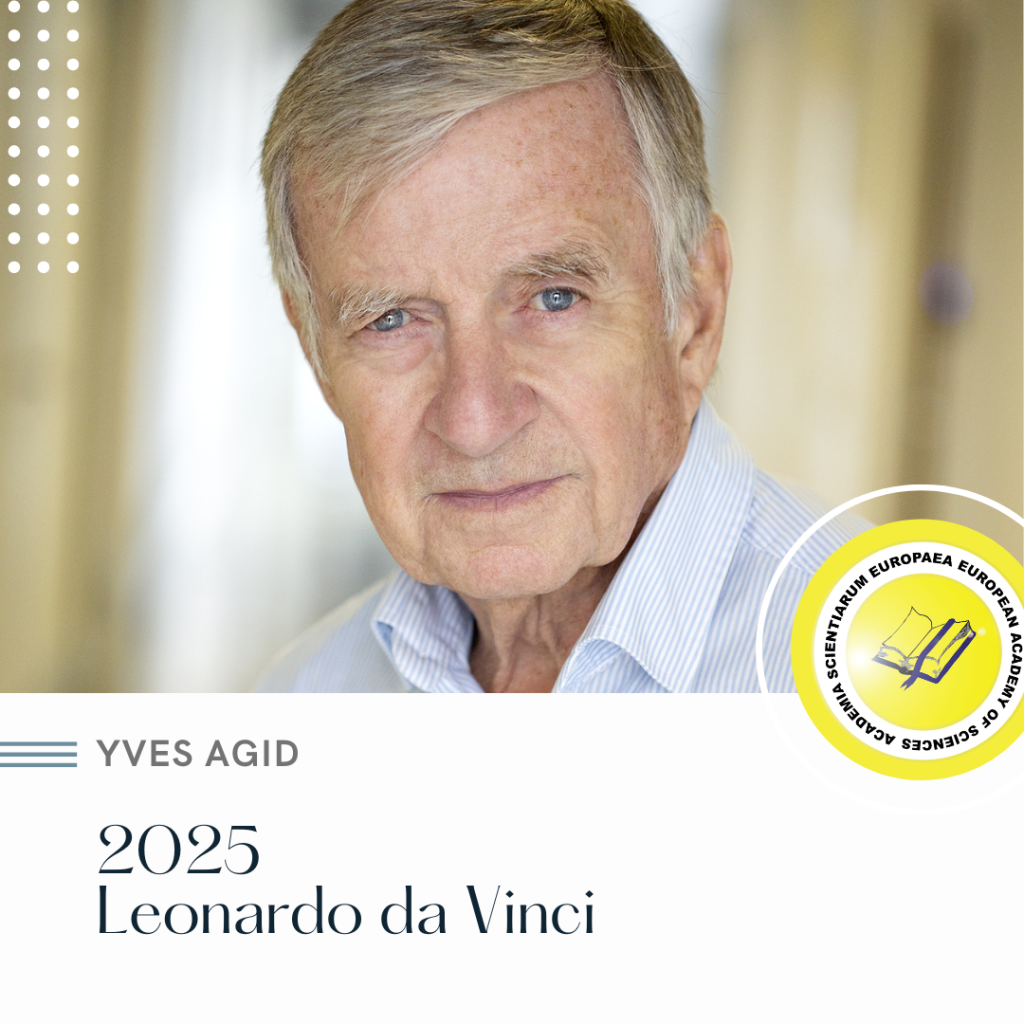
2025 Leonardo da Vinci Award
Professor Yves Agid
The European Academy of Sciences has elected Prof. Yves Agid to receive the 2025 Leonardo da Vinci Award in recognition of his many outstanding contributions to the development of brain science and medicine.
As a neuropsychiatrist, he is a specialist in the management of patients with movement and cognitive disorders. As a neuroscientist, he has been a seminal pioneer in the field of the biology, chemistry, genetics, metabolism, and general understanding of neurodegenerative disorders such as Alzheimer’s disease, Parkinson’s disease, spastic paraplegia, and Charcot Mary-Tooth disease.
The foundational and monumental contribution of Yves Agid to neurology has concerned in particular the mechanisms and consequences of nerve cell death caused by neurodegenerative disorders. In the 1970s, Professor Yves Agid was the first to establish a continuum from genetics and molecular biology to therapeutics in this unexplored field.
Other seminal contributions of Professor Agid consist of the introduction of the concept of “sub-cortical dementia” and also concern the physiological role of the brain structure called basal ganglia, which is located in the center of the brain.
Professor Yves Agid has served as Professor of both Neurology and of Cellular Biology. He is the founder of the Paris Brain Institute which brings hundreds of patients, medical doctors, and researchers together for basic and clinical research.
Beyond his brilliant scientific and medical career where his discoveries are of considerable relevance to human health, Yves AGID has produced many important books to popularize brain science to the public.
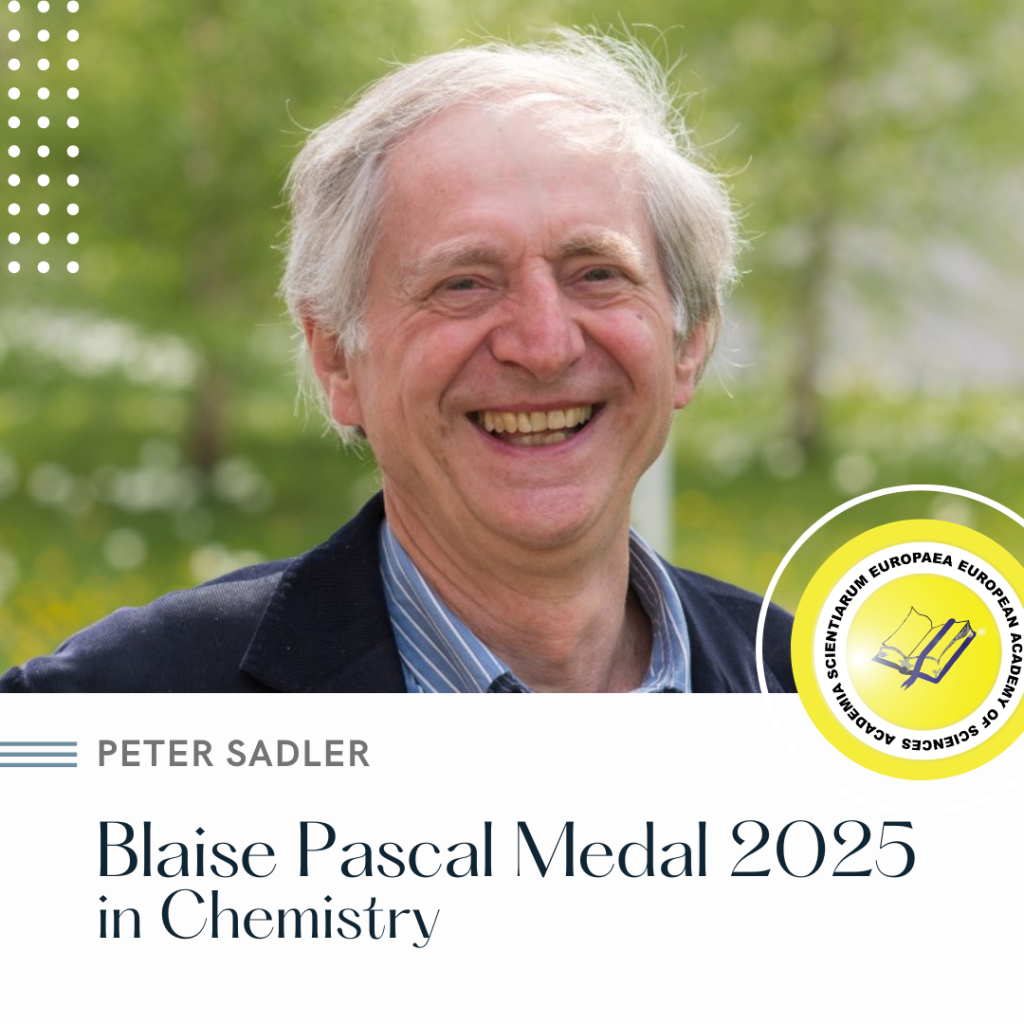
2025 Blaise Pascal Medal in Chemistry
Professor Peter Sadler
Professor Peter Sadler, from the University of Warwick (UK), is honoured with the 2025 Blaise Pascal Medal in Chemistry for his pioneering contributions to the field of bioinorganic chemistry and his lifelong dedication to advancing metal-based therapeutics.
Professor Sadler began his research in the 1970’s, medicinal inorganic chemistry was a largely unrecognised field of research. He took the initiative in 1996 to found the EU COST Action D8 “Chemistry of Metals in Medicine”, which provided a major opportunity for over 100 laboratories from 23 European countries to exchange ideas and collaborate.
Following his early work on the elucidation of the structure and mechanism of action of gold antiarthritic drugs, he contributed to the clinical development of platinum anticancer drugs and pioneered the use of multinuclear NMR, especially 15N isotopic labelling, to elucidate the kinetics of Pt-DNA crosslinking. His work on gadolinium complexes led to some of the earliest patents on Magnetic Resonance Imaging (MRI) contrast agents while his research on bismuth began by elucidating the chemistry of Glaxo’s antiulcer drug Pylorid. Sadler’s group provided a new understanding of physiologically important interactions of proteins with other biometals such as Zn, Cu and Cd. He also introduced half-sandwich Ru(II) arene complexes as novel anticancer agents. The first examples of asymmetric transfer hydrogenation in intact cells, of a multimodal theranostic metal complex for hypoxic tumours activated by cell enzymes and visible light, the discovery of a new class of photoactivatable diazido platinum(IV) prodrugs, and the use of iridium(III) anticancer photocatalysts in living cells represent other achievements of Sadler’s group.
The diversity and impact of Peter Sadler’s research are most impressive. His achievements have resulted in numerous highly prestigious national and international awards and invitations worldwide to present lectures, which benefit from his remarkable talent as scientific communicator. He should also be commended for this outreach activities and public engagement.
Peter Sadler is an outstanding and most deserving recipient of the Blaise Pascal Medal in Chemistry.
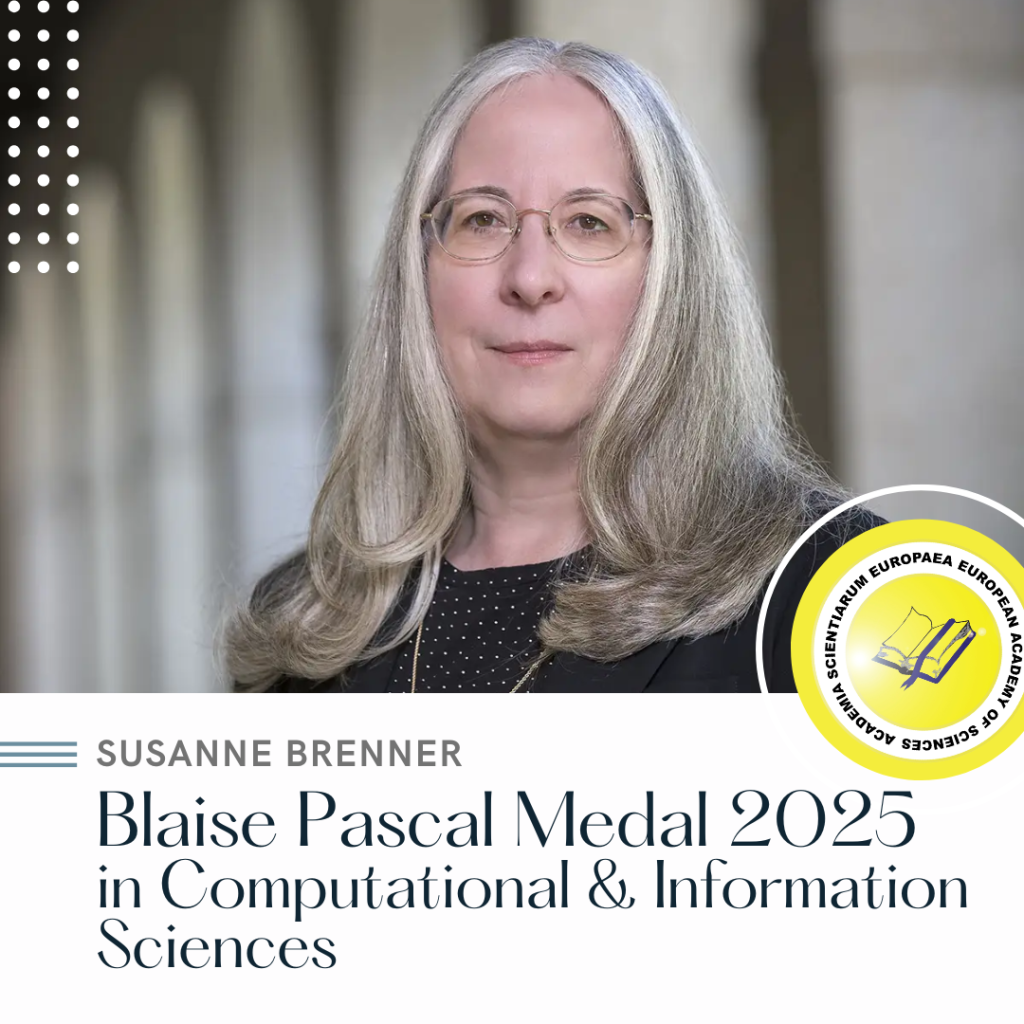
2025 Blaise Pascal Medal in Computational and Information Sciences
Professor Susanne Brenner
Professor Susanne Brenner is Boyd Professor at Louisiana State University and is one of the world’s foremost experts in the numerical analysis of partial differential equations, an important branch of Computational Mathematics, to which she has made very significant and profound contributions.
Professor Brenner is a recipient of numerous honours: she was elected a Fellow of the American Mathematical Society, a Fellow of the Society for Industrial and Applied Mathematics, a Fellow of the American Association for the Advancement of Science, she gave the 2011 Sonia Kovalevsky Lecture of the Association for Women in Mathematics, and she was the year 2024 Feng Kang Distinguished Visiting Professor of the Chinese Academy of Sciences. She was President of the Society for Industrial and Applied Mathematics and a member of the Council of the American Mathematical Society. Professor Brenner has strong connections with European science: she is a member of the Scientific Advisory Boards of the Weierstrass Institute in Berlin, and of the Hausdorff Center for Mathematics at the University of Bonn.
The officers of the Computational and Information Sciences of EurASc are unanimous in their enthusiastic support of her nomination for the 2025 Blaise Pascal Medal of the European Academy of Sciences.
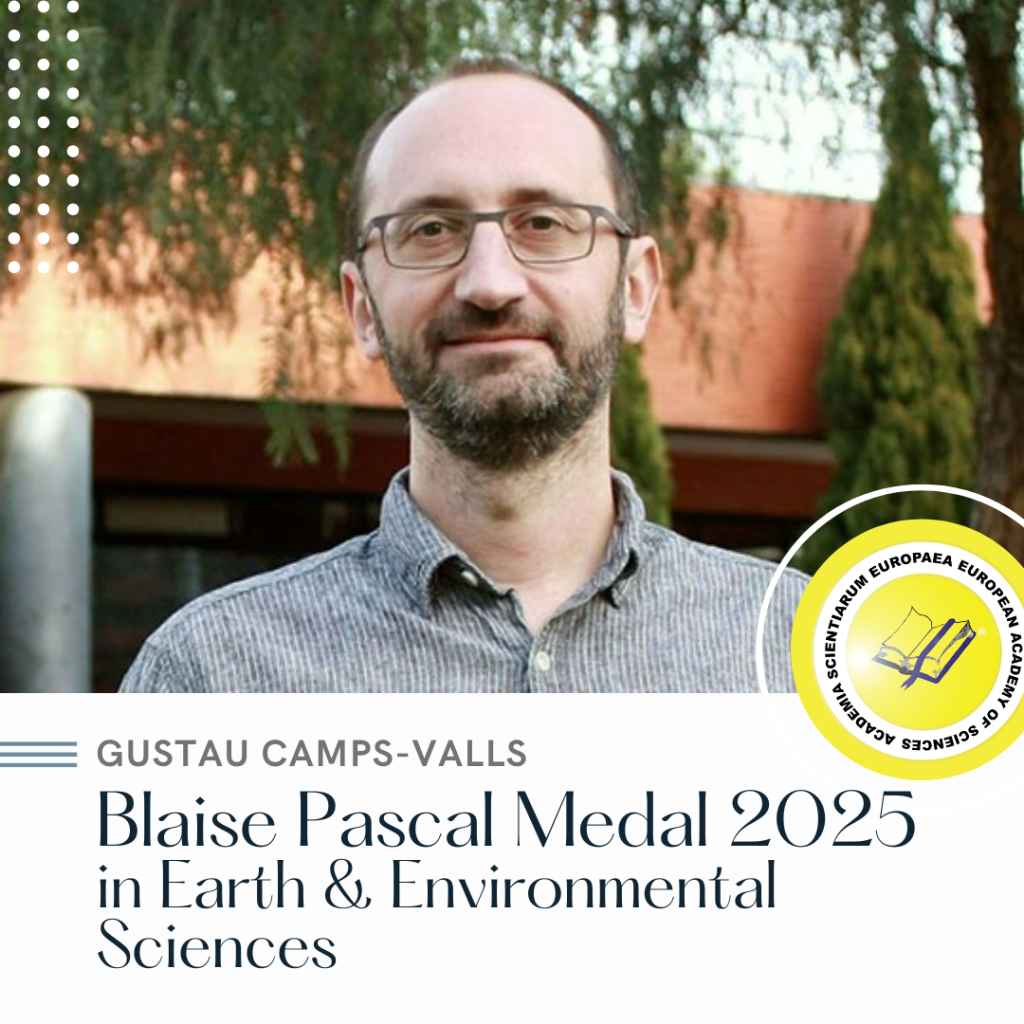
2025 Blaise Pascal Medal in Earth and Environmental Sciences
Professor Gustau Camps-Valls
Professor Camps-Valls has revolutionized how we model and understand the Earth system through hybrid AI and causal inference approaches. He was among the first to integrate advanced machine learning methods with physical models of climate and environment. Early in his career, he introduced kernel methods and modern AI techniques into remote sensing and Earth observation, which led to profoundly transform data analysis in these domains. More recently, he has led the development of “physics-aware” machine learning models – hybrid approaches that combine data-driven algorithms with fundamental physical laws, to ensure that predictions of climate changes and environmental phenomena remain robust and scientifically interpretable. Also groundbreaking is his work on causal inference in Earth sciences, where he and collaborators have developed methods to uncover cause-effect relationships from complex climate data. These contributions are not just academic exercises. In effect, they provide deeper insight into pressing questions like identifying drivers of extreme weather events and assessing the impacts of climate change. Pr. Camps-Valls’s innovative causality and hybrid modeling frameworks enable scientists to move from mere correlations to a deep understanding of Earth system dynamics, a paradigm shift in climate science.
Beyond his research innovations, Prof. Camps-Valls is renowned for his international leadership and interdisciplinary bridge-building. He proposed and developed large multi-institutional projects that unite AI experts, climate modelers, and environmental scientists. He is co-principal Investigator of the prestigious ERC Synergy project USMILE (2019–2025), a €10M initiative bringing together top European and international scientists to integrate machine learning with climate modeling. This project, involving institutions across Europe and the US, demonstrates his ability to lead diverse teams toward a common goal of advancing Earth system science. It is worth mentioning that before his ERC Synergy Grant in Physical Sciences in, 2019, Pr. Camps-Valls won in 2015 an ERC Consolidator Grant in Computer Science. Besides, as coordinator of the “Machine Learning for Earth and Climate Sciences” program of the European ELLIS network, he has built bridges between the machine learning community and geoscientists across Europe. Furthermore, he serves on high-level advisory boards (for ESA, EUMETSAT, and the European Science Foundation), guiding space agencies and research funders on leveraging AI to benefit society. In addition to EurASc, Pr Camps-Valls is a member of the Academia Europaea, of ELLIS (European Laboratory for Learning and Intelligent Systems), and of the Asia-Pacific AI Association. Recently, he was awarded the IEEE David Landgrebe Prize.
Gustau Camps-Valls is an outstanding and most deserving recipient of the Blaise Pascal Medal in Earth and Environmental Sciences.
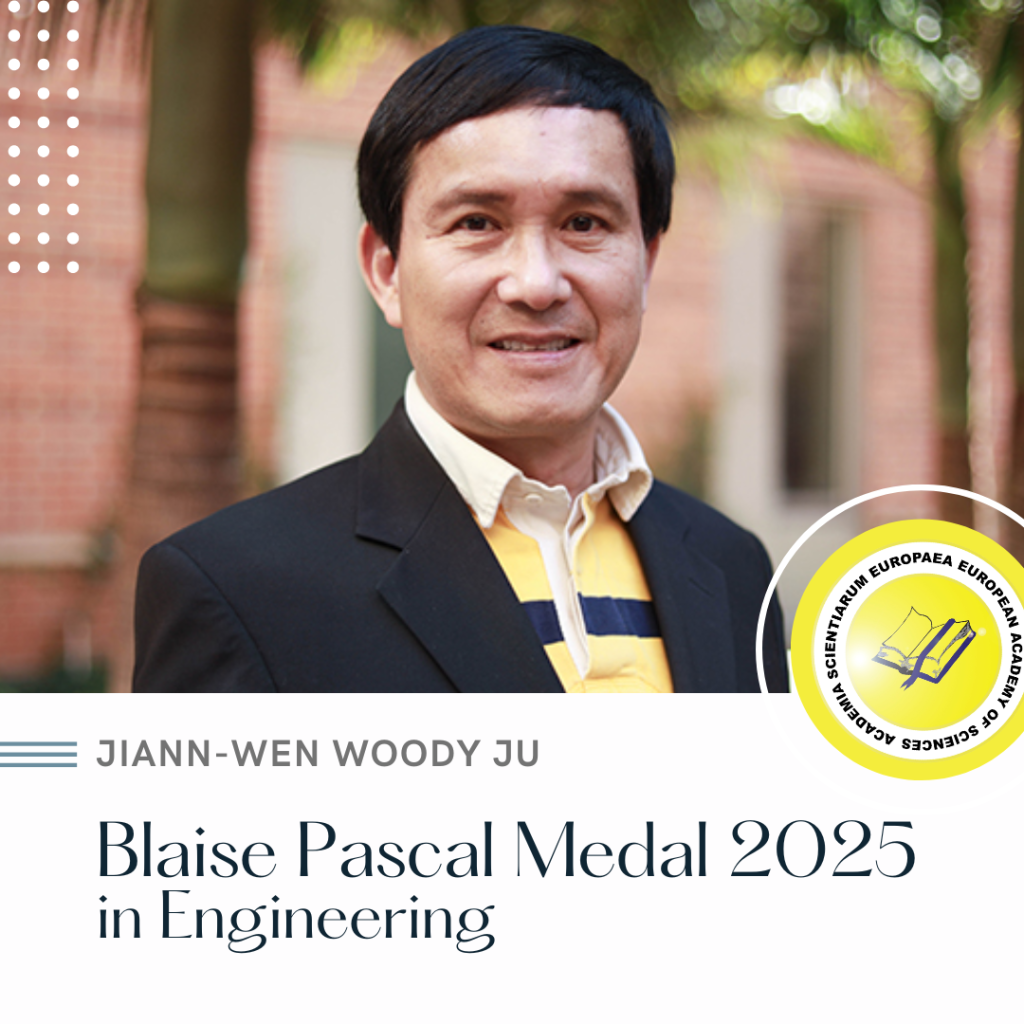
2025 Blaise Pascal Medal in Engineering
Professor Jiann-Wen Woody Ju
Prof. Ju is a pioneering researcher whose groundbreaking work has profoundly influenced the fields of computational damage mechanics and micromechanics. His seminal contributions—particularly the extension of scalar damage models to anisotropic formulations and the integration of micromechanical considerations—have established a robust, thermodynamically consistent framework that bridges microstructural and engineering scales.
These innovations have enabled accurate modeling of damage and healing processes in a wide range of materials, including concrete, rocks, advanced composites, and asphalt systems, thereby impacting both academia and industry worldwide. Prof. Ju’s scholarly record is distinguished by over 215 high-impact publications, nearly 13,000 citations, and an h-index of 55. His leadership extends beyond research; he serves as Editor-in-Chief of the International Journal of Damage Mechanics and actively contributes to numerous prestigious conferences and professional societies.
Recognized with several awards, including the ICDM Lifetime Achievement Medal and election to the European Academy of Sciences and Arts, Prof. Ju exemplifies the highest standards of scientific excellence and innovation. His pioneering work and lasting influence make him a most deserving recipient of the Blaise Pascal Medal.
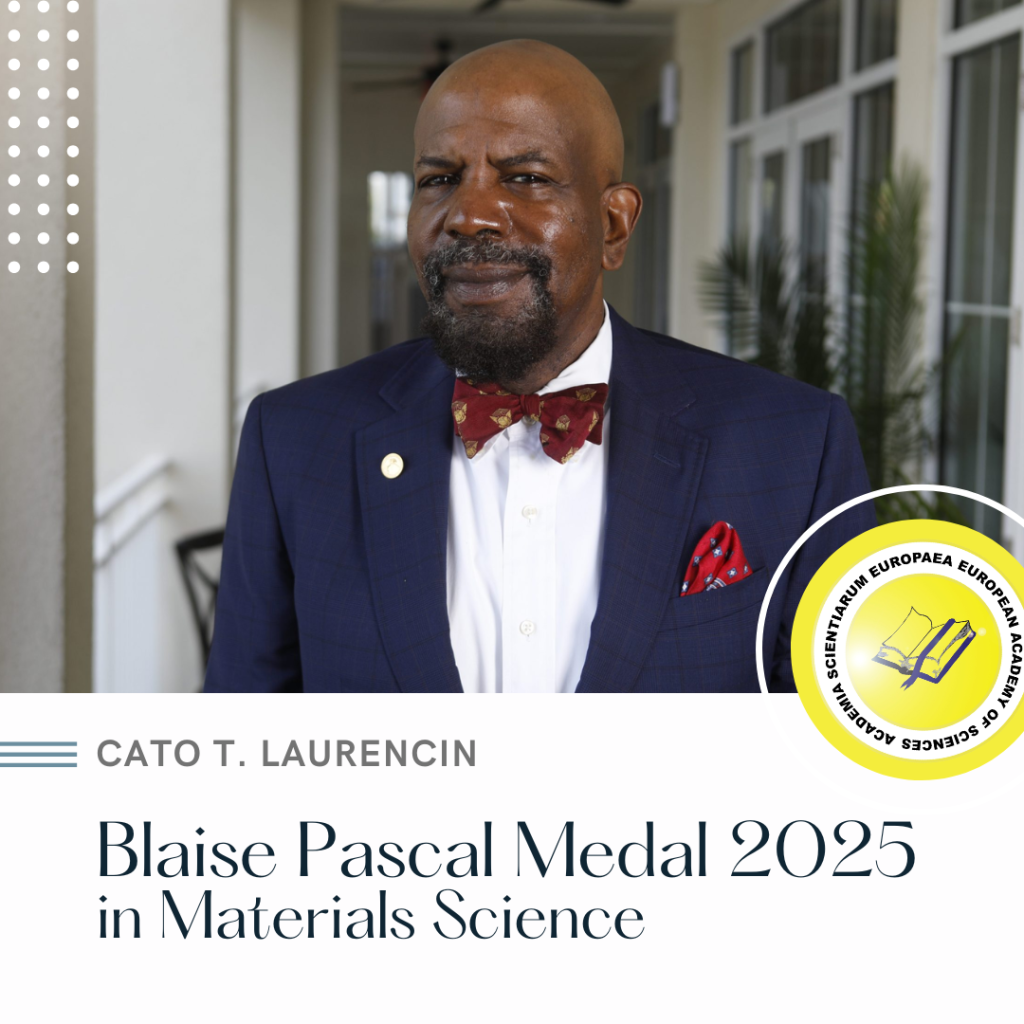
2025 Blaise Pascal Medal in Materials Science
Professor Cato Laurencin
Sir Cato Laurencin has produced pioneering technologies for musculoskeletal repair and regeneration leveraging cutting edge expertise in polymeric materials science and engineering. He is a leading international figure in science and its applications, who has made great contributions to materials science and biomedical engineering. His work spans fundamental basic science involving polymeric materials all the way to clinical trials and clinical treatment. His work has resulted in an array of products that have helped improve human health.
Dr. Laurencin is considered as the founder of the field of Regenerative Engineering, defined as the convergence of advanced materials science, stem cell science, physics, developmental biology, and clinical translation for the regeneration of complex tissues and organs.
He is one of very few elected into the US National Academies of: Science, Engineering, Medicine and Inventors. In addition, he is the first and so far only person to be awarded both the highest/oldest honor of the National Academy of Engineering (the Simon Ramo Founders Award) and the highest/oldest honor of the National Academy of Medicine (the Walsh McDermott Prize).
Sir Cato Laurencin is an outstanding and most deserving recipient of the Blaise Pascal Medal in Materials Science.
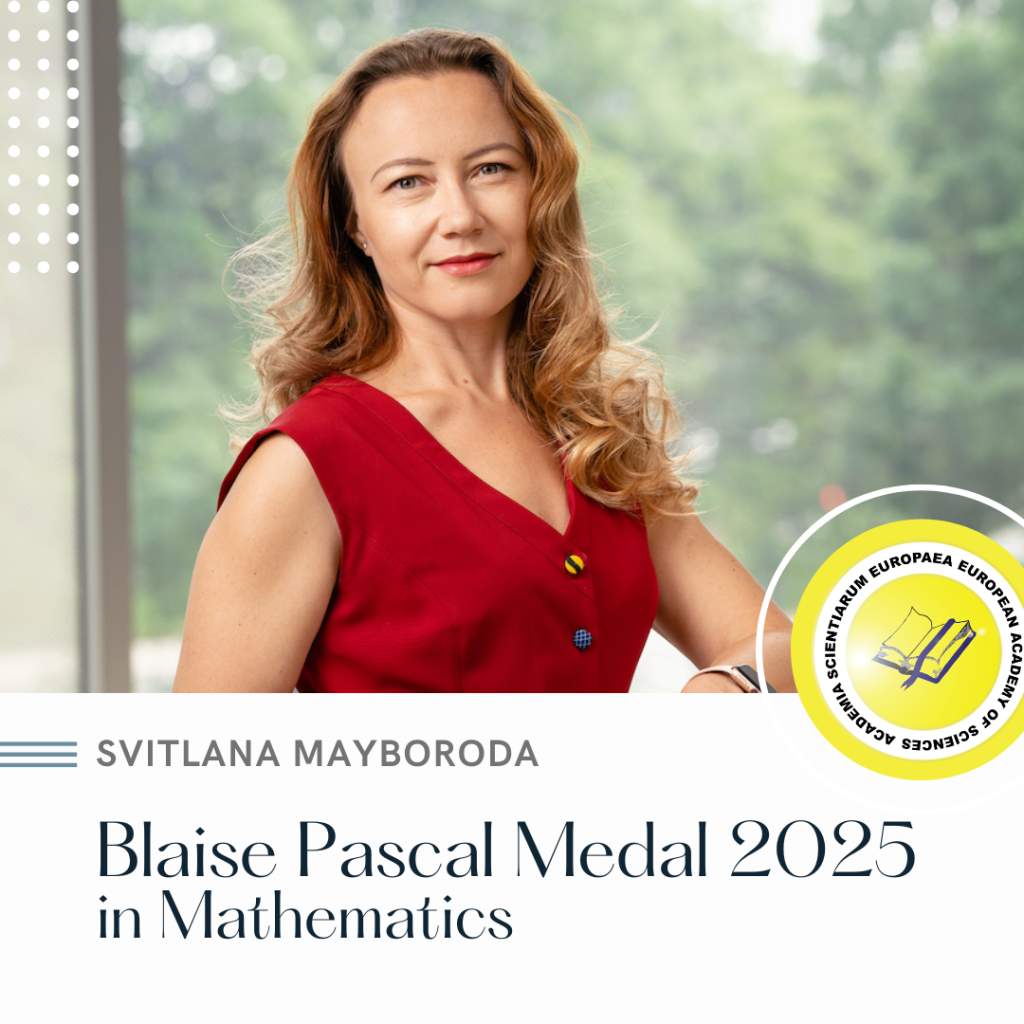
2025 Blaise Pascal Medal in Mathematics
Professor Svitlana Mayboroda
The Blaise Pascal Medal 2025 is awarded to Svitlana Mayboroda for her contributions in the theory of elliptic partial differential equations, regularity of harmonic measures in rough domains, and the landscape approach to understand the phenomena of Anderson localization.
Svitlana Mayboroda has been working in elliptic partial differential equations, particularly with regards to the regularity of harmonic measures and Green’s functions on rough domains. Mayboroda has obtained the definitive results on the relation between the rectifiability of a domain co-dimensional one boundary and the absolute continuity of its elliptic harmonic measure. She has also developed a comprehensive, entirely new analytic theory for domains with a lower dimensional boundary (lower than the classical “space dimension minus one”), linking very fine analytic, geometric, and partial differential equations properties in this setting.
Starting around 2012, Mayboroda began a remarkable collaboration with the physicist Marcel Filoche on understanding the eigenfunctions of Anderson model operators (Schrodinger operators with a random potential). They discovered, first numerically and then with increasing levels of theoretical justification, a remarkable phenomenon that low energy eigenfunctions of such operators were localized in the wells of a specific effective potential that is now known as the landscape function. This is one of the most striking and unexpected discoveries in elliptic theory in the last decade at least. Currently, Mayboroda and her coauthors are applying the landscape theory to analyse the phenomenon of Anderson localization, obtaining both new theoretical and new numerical predictions on problems at the frontier of this subject, such as that of understanding the mobility edge between localized and delocalized states.
The idea of the landscape is very simple, and no technical power is needed to formulate it, but it is strikingly original, and it changes the game completely. It is clearly the correct way to view Anderson localisation, yet no one saw it for half a century. Moreover, It has led to important practical applications such as improvements in LED lighting, semiconductors and solar cells performance.
Svitlana Mayboroda is an outstanding and most deserving recipient of the Blaise Pascal Medal in Mathematics.
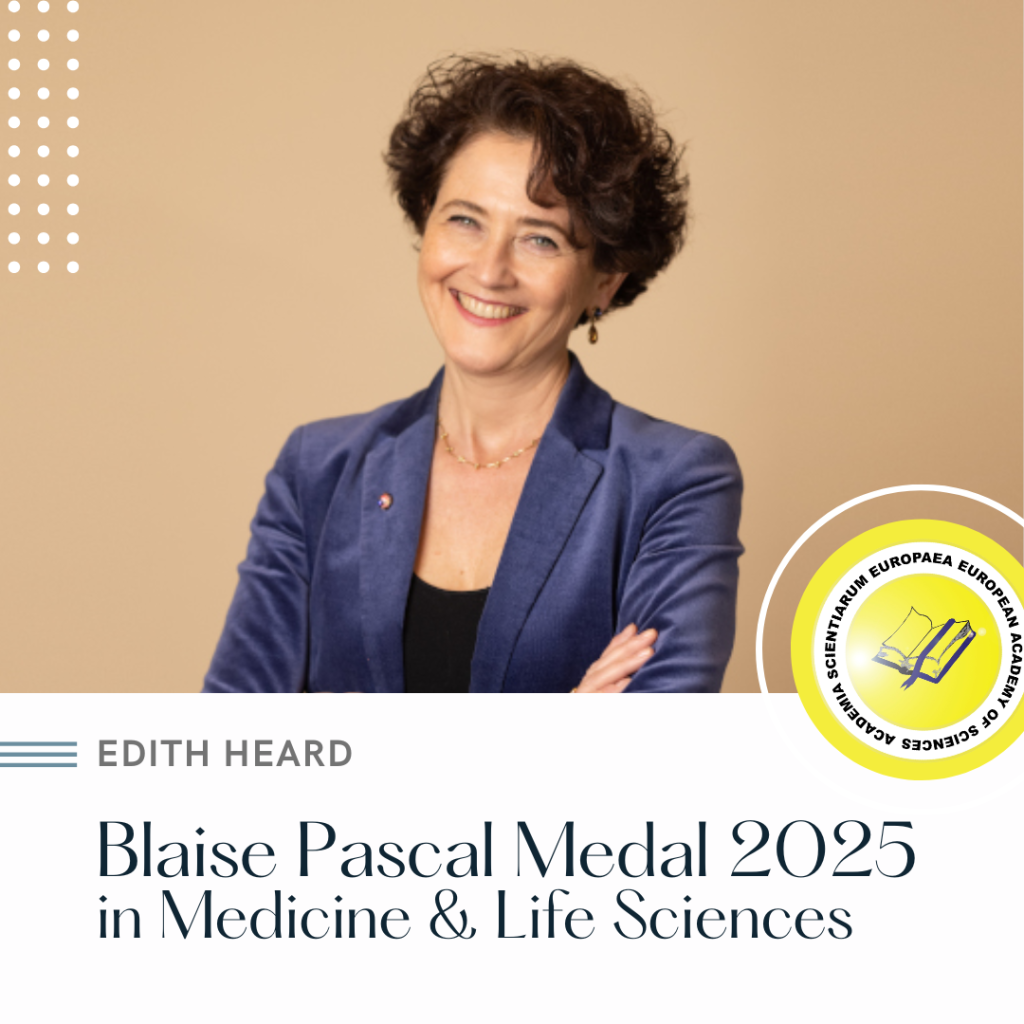
2025 Blaise Pascal Medal in Medicine and Life Sciences
Professor Edith Heard
Professor Edith Heard is a symbol of international European Scientist, having excellently served science in three different European countries. Among her eminent academic positions, Edith Heard has been appointed in 2012 Professor at the Collège de France, which is one of the most recognized French academic institution, holding the Chair of Epigenetics and Cellular Memory. In 2019, Edith Heard started as Director General of prestigious European Molecular Biology Laboratory, EMBL, where she is the first woman to hold this position.
Edith Heard is a leading reference in modern biology. She has mostly devoted herself to the epigenetic process of X chromosome inactivation in mammals, a process essential to the development of female embryos. While females have two X chromosomes, males have only one, accompanied by a Y chromosome. However, the Y chromosome carries only about a hundred genes, while the X chromosome has more than a thousand. To compensate for this imbalance between males and females, one of the redundant two X chromosomes in females is completely inactivated by an epigenetic process. If this process fails, the embryo does not survive. Imperfect X chromosome inactivation can be linked to neurological diseases, autoimmune diseases, or even certain cancers, which illustrates the important contribution to medicine of Edith Heard’s scientific results.
Edith Heard’s outstanding contribution to Science is attested by numerous publications in the most prestigious journals in the fields of biology and medicine. She has also received many notable awards, among them the CNRS Gold Medal of the French Centre National de la Recherche Scientifique, which is the CNRS highest distinction, and the Grand Prix of French National Health Institute. Edith Heard also plays an eminent societal role in providing help to scientists from geopolitical crisis zones.
Edith Heard is an outstanding and most deserving recipient of the Blaise Pascal Medal in Medicine and Life Sciences.
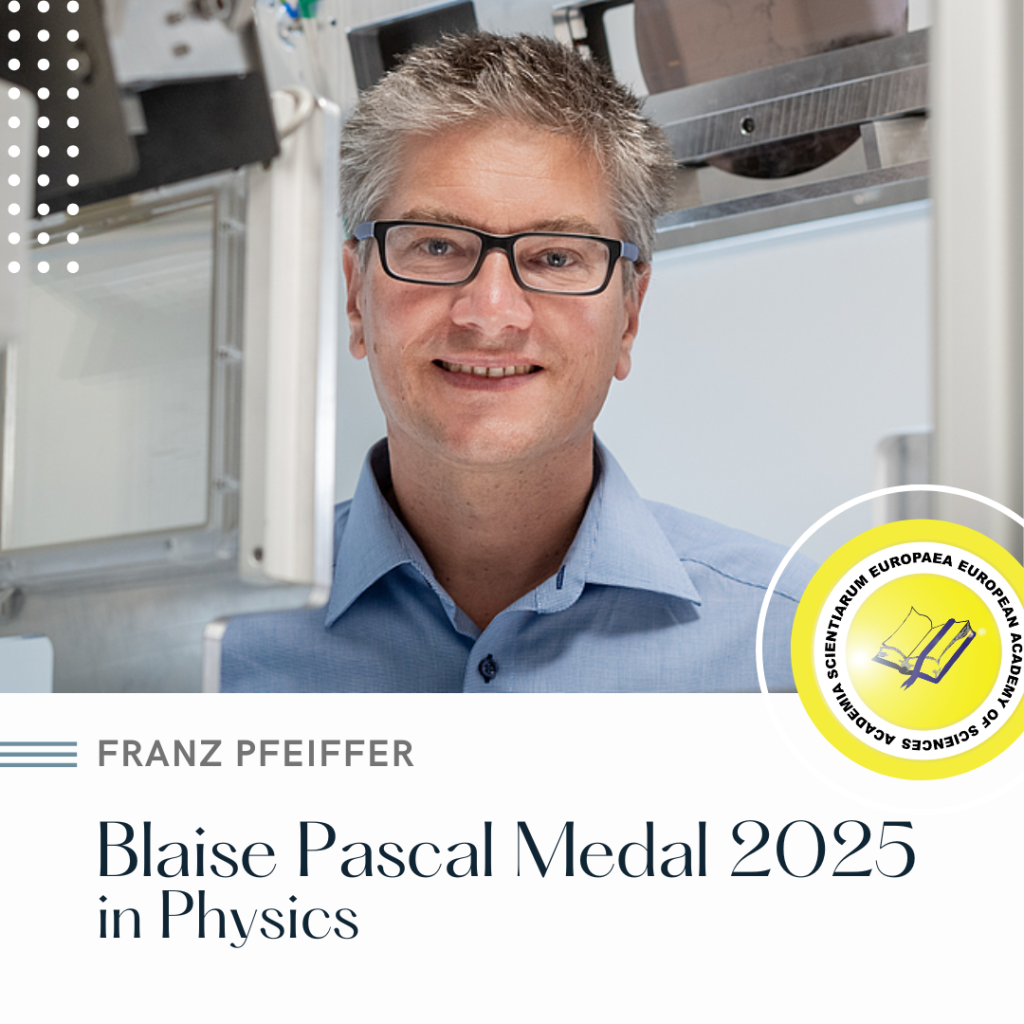
2025 Blaise Pascal Medal in Physics
Professor Franz Pfeiffer
Prof. Dr. Franz Pfeiffer is an eminent German physicist, universally recognized for his remarkable and groundbreaking contributions in the field of X-Ray physics and direct application to X-ray phase contrast and dark field medical imaging. His work has not only advanced scientific knowledge but also holds great potential for revolutionizing early detection and precision diagnosis of lung diseases, addressing critical challenges to human health.
His international career started at the Ludwig-Maximilians-University in Munich. He then moved to the Institute Laue Langevin and the European Synchrotron facility in Grenoble, France, where he got his PhD in 2003. where he got his PhD. in X-ray and Neutron Physics. Since then, he has held positions at renowned institutions such as the University of Illinois, Urbana-Champaign, and the Swiss Light Source, Paul Scherrer Institute in Switzerland. In 2009, Prof. Pfeiffer became a Full Professor for Biomedical Physics at the Technical University of Munich, where he currently serves as the Director of the Munich Institute of Biomedical Engineering.
The potential impact of Prof. Pfeiffer’s work on healthcare and radiology is immense. Dark-field X-ray imaging has the potential to revolutionize early detection and precision diagnosis of lung diseases, which are among the top six leading causes of death worldwide. This has been recognized with prestigious awards and prizes, such as the Gottfried Wilhelm Leibniz Prize of the German Science Foundation and the National Latsis Prize in Switzerland.
Moreover, Prof. Pfeiffer’s work has been recognized internationally through substantial funding from the European Research Council (ERC, with an ERC Starting Grant, followed by an ERC Advanced Grant, an more recently, an ERC Synergy Grant, to develop a revolutionary detector concept for X-ray Darkfield Imaging.
Franz Pfeiffer is an outstanding and most deserving recipient of the Blaise Pascal Medal in Physics.
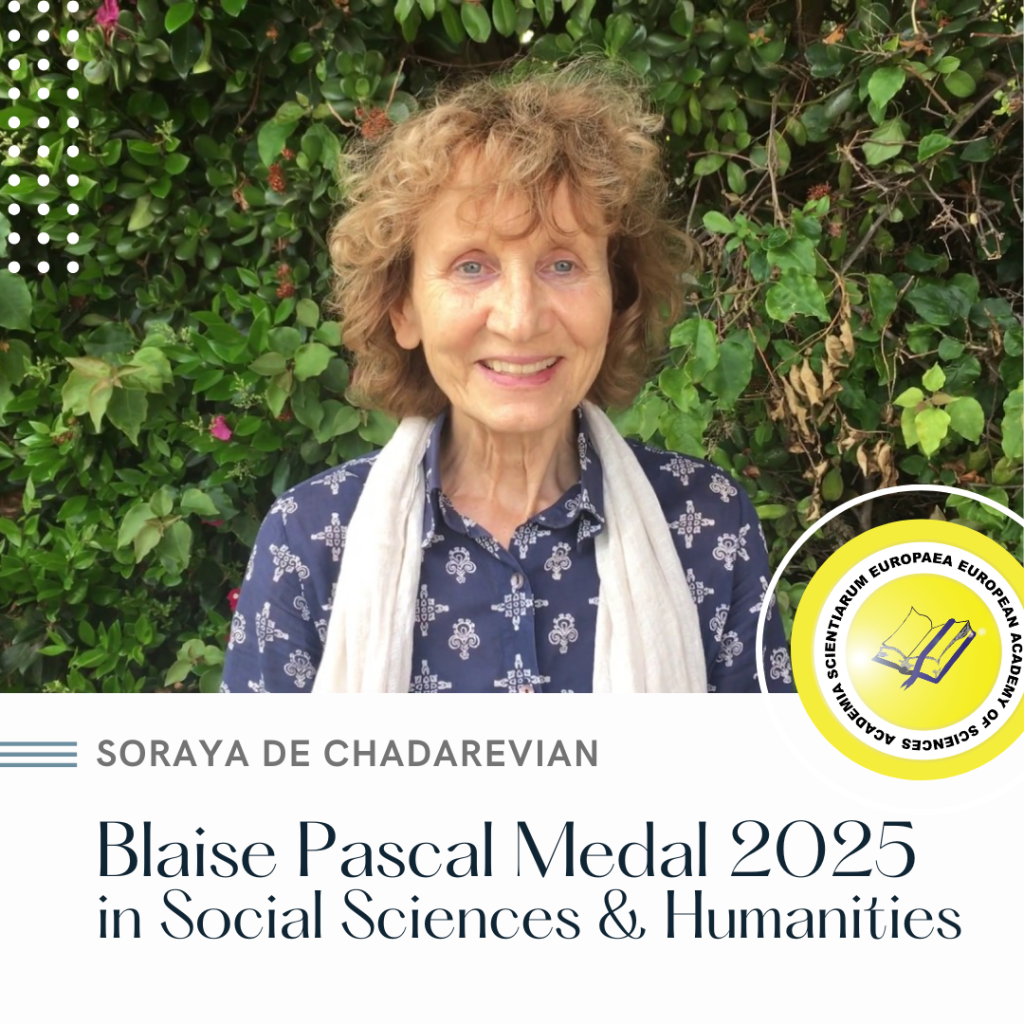
2025 Blaise Pascal Medal in Social Sciences and Humanities
Professor Soraya de Chadarevian
Soraya de Chadarevian is a towering figure in the history of science, and one of the leading historians of the life sciences worldwide. Her scholarship spans an astounding breadth of themes and topics, which, at the same time, are always treated with an immense depth of understanding. Similarly, her interdisciplinary approach has allowed her to seamlessly integrate philosophical and contextual factors into her historical accounts.
De Chadarevian’s work has fundamentally shaped our understanding of the historical development and epistemic foundations of biology in its intertwinement with neighboring fields, and she is widely recognized for her commitment to promote a constructive dialogue between life scientists and historians of science.
Yet, de Chadarevian is not only a stellar researcher; she has also been prepared to serve her field in institutional respect, and she is committed to outreach and science communication. Thus, she has served in distinguished leadership roles in the most important international scholarly society in the field, i.e., the History of Science Society (HSS), and by serving as editor and board member for some of the most prestigious journals of the field. Académie Européenne des Sciences
Soraya de Chadarevian is an outstanding and most deserving recipient of the Blaise Pascal Medal in Social Sciences and Humanities.
